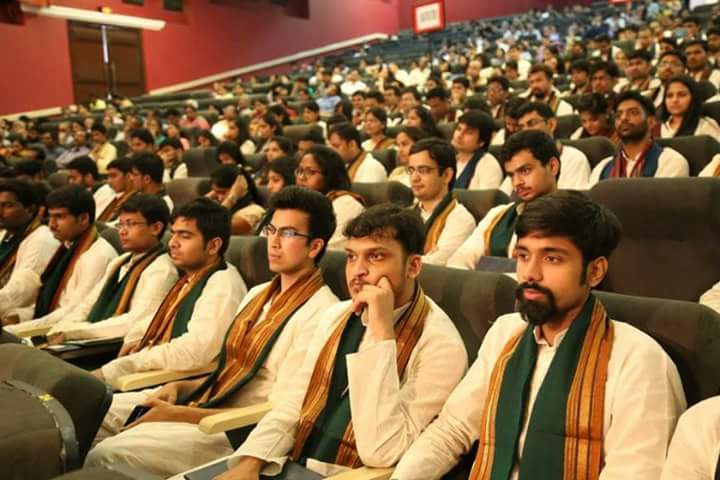‘IIT Kanpur bring a change in their graduation dress for the recent convocation ceremony’
‘IIIT Hyderabad switch to kurtas and angvastrams for convocation’
‘Convocational robes to be replaced by traditional attire at all MP universities’
Notice the connecting point. All are talking of shedding off another colonial stigma that loomed large in our academic circles. Yes, you’re right, we’re talking of substituting ethnic wear for the cumbersome Victorian cloaks and gowns, that used to be the norm at the graduation ceremonies in almost all of the Indian universities and colleges, specifically the elite ones.
A saga ends. Another begins!
Pictures from the 15th annual convocation of IIIT Hyderabad on 13th August, 2016. pic.twitter.com/RmkAvoZq7y— IIIT Hyderabad (@iiit_hyderabad) August 14, 2016
There is a popular joke, ‘The British left the nation, but forgot the……..’ Among the few banes that the British forgot to take back, which includes the sycophants in mainstream media, the cloak and gown code in convocation is something that they really needed to take back with them. But no, there are a few things which most of the Indians, who like Germans, earlier preferred to be dissociated with their nationality, continued to cling to anything that is Western, no matter how cumbersome or demeaning it would look.
Besides, the graduation robes bring their own maladies with themselves. The convocations mostly happen between March – June, when almost the whole of India is baked under the hot sun. In such a situation, doesn’t the robe feel a bit uncomfortable? What’s wrong with a comfortable ethnic wear as a substitute?
The students of the institutes mentioned aren’t the first ones to break this trend. Graduates from the holy Banaras Hindu University have been wearing turbans and angvastrams for decades in place of the cumbersome dresses as recommended for the convocation. Even my university, Chattrapati Shahu Maharaj University, doesn’t prescribe gowns compulsorily, though angvastrams bearing the logo of the University are preferred more.
Besides, a few of the politicians did attempt at restoring the glory of the Indian culture and the attire, though with mixed to zero results. It was surprisingly Jairam Ramesh, a known sycophant of the Congress party, who had set a significant trend by throwing down the British styled gown at a convocation ceremony 7 years ago and advocating for an Indian substitute instead.
After 7 years, it seems that the young students of India have picked up the initiative to restore the glory and charm of ethnic wear, even if it’s just for a formal convocation ceremony.
It’s really heartening to see institutes like IIT Kanpur, who completely ripped apart the Victorian trend for the much more comfortable, Indian ethnic wear, and never before did the graduates look so charming as they did that day. As noted by CM of Madhya Pradesh, Shivraj Singh Chauhan, the perception that anything with English touch is always superior to anything Indian or Hindu must not only be discouraged, but also removed, and the pride in knowing your native culture and customs must be restored with full honor. When Americans love their quirky dresses, and Japanese love their kimonos and gowns, so why can’t we embrace our traditional kurtas and pyjamas/dhotis, at an occasion, when we step into the real world from the ideal world of education?
However, like the famous slang ‘kabab mein haddi’ [a sore to the eye], there are some folks, who hate to see such a welcome change. Tagging themselves as eminent intellectuals, they paint any such attempt to Indianize things as ‘saffronization’ and ‘attempts to destroy the moral secular fabric of the nation’. If you don’t believe me, look at this epic piece of rubbish published by Scroll in the wake of such a possible change, 2 years ago:-
[Some folks never improve, do they?]
To sum it up, the radical change in the attire for convocation not only signifies a new dawn in the spectrum of Indian education, but also indicates a small, but right step in the making of a renovated, innovative and revolutionary India, who doesn’t hesitate to accept the beauty of their culture in just the right degree.
